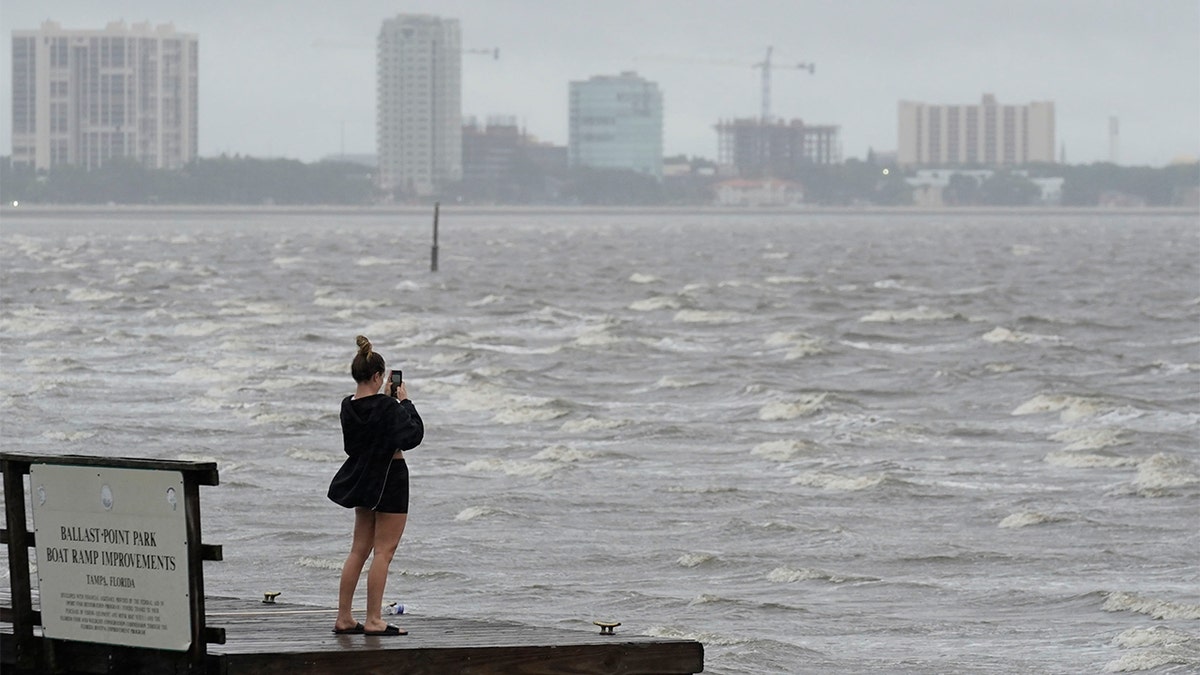Saffir-Simpson Hurricane Wind Scale animation from the National Hurricane Center
This animation shows hurricane categories and the potential damage caused by certain wind speeds. Courtesy: National Hurricane Center
Hurricane Ian is near Category 5 status as Floridians prepare for landfall Wednesday.
What is a Category 5 hurricane? What do hurricane categories mean? That is where the National Hurricane Center comes in.
The Saffir-Simpson Hurricane Wind Scale is a 1 to 5 rating based only on a hurricane's maximum sustained wind speed. The scale does not take into account other potentially deadly hazards such as storm surge, rainfall flooding and tornadoes.
The Saffir-Simpson Hurricane Wind Scale estimates potential property damage. While all hurricanes produce life-threatening winds, hurricanes rated Category 3 and higher are known as major hurricanes. Major hurricanes can cause devastating to catastrophic wind damage and significant loss of life simply due to the strength of their winds. Hurricanes of all categories can produce deadly storm surge, rain-induced floods and tornadoes. These hazards require people to take protective action, including evacuating from areas vulnerable to storm surge.
HURRICANE IAN: DESANTIS WARNS OF 'NASTY' DAYS AHEAD, TELLS FLORIDIANS IT'S TOO LATE TO EVACUATE
"Herbert Saffir, a civil engineer from Florida, and Dr. Robert Simpson, director of the NHC from 1967-74, created this classification scale to categorize hurricanes by the types of damage that typically occur at various sustained wind speeds. Saffir initially developed the scale in 1969, and it would later be expanded by Simpson and published under the Saffir-Simpson name in 1973," FOX Weather reports.
HURRICANE IAN TAKES AIM AT FLORIDA: WHAT TO KNOW ABOUT THE MAJOR STORM

A woman takes photos of the surf on Tampa Bay ahead of Hurricane Ian, Wednesday, Sept. 28, 2022, in Tampa, Fla. (AP Photo/Chris O'Meara)
Category 1 hurricane (74-95 mph): Very dangerous winds will produce some damage
Well-constructed frame homes could have home damage to roofs, shingles, vinyl siding and gutters. Large branches of trees will snap, and shallowly rooted trees may be toppled. Extensive damage to power lines and poles likely will result in power outages that could last a few to several days.
Category 2 hurricane (96-110 mph): Extremely dangerous winds will cause extensive damage
LIVE UPDATES: HURRICANE IAN TRACKER, WARNINGS AND ADVISORIES
More property damage will occur on well-constructed frame homes could sustain major roof and siding damage. Many shallowly rooted trees will be snapped or uprooted and block numerous roads. Near-total power loss is expected, with outages that could last from several days to weeks.
Category 3 hurricane (111-129 mph): Devastating damage will occur
Well-built framed homes may incur major damage or removal of roof decking and gable ends from the wind. Many trees will be snapped or uprooted, blocking numerous roads. Electricity and water will be unavailable for several days to weeks after the storm passes.
HURRICANE IAN EVACUATION: WHAT TO PACK
Category 4 hurricane (130-156 mph): Catastrophic damage will occur
Well-built framed homes can sustain severe damage, with loss of most of the roof structure and/or some exterior walls. Most trees will be snapped or uprooted and power poles downed. Fallen trees and power poles will isolate residential areas. Power outages will last weeks to possibly months. Most of the area will be uninhabitable for weeks or months.
Category 5 hurricane (157 mph or higher): Catastrophic damage will occur
The highest hurricane category – A large percentage of framed homes will be destroyed, with total roof failure and wall collapse. Fallen trees and power poles will isolate residential areas. Power outages will last for weeks to possibly months. Most of the area will be uninhabitable for weeks or months.
CLICK HERE TO GET THE FOX NEWS APP
The Florida Highway Patrol closed the Sunshine Skyway Bridge in St. Petersburg Wednesday morning after winds in the area associated with Hurricane Ian were clocked between 50 and 60 mph, The Tampa Bay Times reported.










































